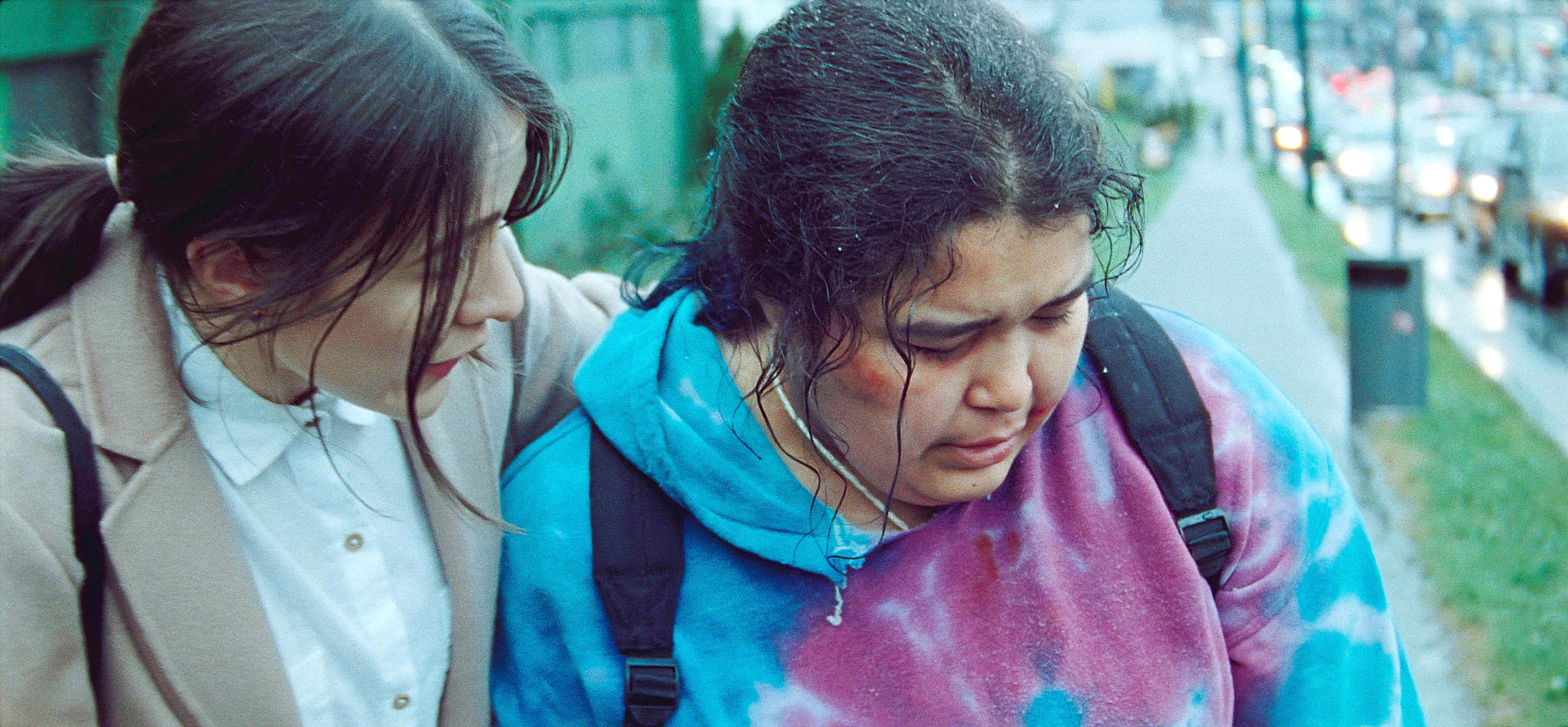Review by Julianna Ramsey
When I think about stories of abuse on the screen, HBO’s Big LIttle Lies always comes to mind. Witty, observant, and satisfying, the subplot centering around stay at home mom Celeste and her sometimes angelic, sometimes violent husband Perry won the show a great amount of acclaim. The Body Remembers When the World Broke Open explores similar themes in a radically different way, feeling less like a story and more like a window – a glimpse into the contentious but tender encounter between two real women, with danger lingering just out of frame.
Directed by Elle-Máijá Tailfeathers (who also plays the role of Alia) and Kathleen Hepburn, this 2019 indie drama follows the action in real time, being made primarily of one long, continuous shot. The film is steeped in realism, relying on natural lighting, sound (no score), and small-talk dialogue to relay any plot information.
The action begins when Alia, returning from a visit from the gynecologist, sees Rosie standing at a bus stop. Pregnant and freshly bruised, Rosie stands stock still, gazing into space as her boyfriend screams at her from a distance. Alia reaches out to her and the pair flee to Alia’s apartment. Alia is light-skinned, middle class, and affluent; Rosie is 19, just aged out of aid from her case worker. However, the characters don’t fall into the roles of the “angelic rescuer” and “helpless victim.” They try to small-talk while fixing tea and drying off clothes. Rosie listens to “Little Green” by Joni Mitchell on a record player while Alia makes calls to domestic violence shelters. When their conversation steers towards family, Alia mentions that her partner Ben (only seen in pictures) wants a family, while she isn’t so sure. “Maybe he’ll leave you,” Rosie says bluntly. “Maybe,” Alia responds, smiling and shifting uncomfortably. The central tension of the movie isn’t the abuse and how it will be confronted, but rather how much is Alia willing to give a stranger and how much will Rosie allow someone to have power over her, even when she needs help. A few minutes after insulting her, Rosie guides Alia’s hand over her pregnant belly and smiles.
The most dramatic shift of the film happens in the taxi on the way to a domestic violence shelter. For the first minute, they sit in silence, Alia tapping away at her phone as Rosie gazes around the inside of the cab. The kind of truce established between the two is shifted by the presence of the cab driver, and what he may think when he sees the two women. When the driver asks about her day, Rosie speaks with a confidence and ease the audience hasn’t seen from her before, telling the cab driver they’re sisters, and that she’s taking Alia to rehab. The longer the ride stretches, the more complex the story grows – a dead mother and a soldier father. Alia sits in silence, not wanting to embarrass Rosie by contradicting her. The scene is striking, making it clear that Rosie is fighting for control in her own way, even if it’s in a way the audience and Alia might disagree with.
But even with it’s brilliant bits of characterization and earnest story-telling, the film's commitment to one-shot real time narrative bogs it down, resulting in many slow sequences and clunky bits of dialogue. Characters put on menstrual pads, go to the bathroom, change clothes – all shown without cuts. This results in many scenes of a character anxiously breathing while hiding in a bathroom, which is not necessarily a bad thing, but it wears down the viewer after seeing it multiple times. Tailfeathers and Hepburn create a film that cares far more about verisimilitude than entertaining the audience.
Despite its flaws, it’s that verisimilitude that makes The Body Remembers a good film. At the end of season one of Big Little Lies, Celeste and her friends push her abuser down a set of stairs, intercut with the crashing of waves. At the end of The Body Remembers, Rosie turns away help from the domestic abuse shelter, and returns to her abuser. “It can take six or seven times,” a worker at the shelter confides to Alia, “It’s a start.” This film doesn't seek to answer questions or solve anything. It asks the audience to sit with discomfort, and engage with their own place in the cycle of abuse, because in reality, resolution isn’t inevitable. It’s not even typical. But films like this might just be a start.
The Body Remembers When the World Broke Open is available on Netflix.

